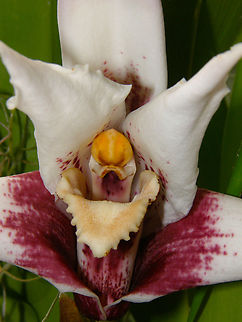
Appearance
Epiphytic or lithophytic, cespitose, robust, with creeping rhizome, filiform roots and ovoidal pseudobulbs, compressed laterally, 5-10 cm long, provided at the apex of one oblong-elliptical leaf with acute apex, up to about 40 cm long and 5-7 cm broad. Ascending or sem-drooping basal inflorescences, 10-25 cm long, on a peduncle provided of imbricate bracts, 2,5-3,5 cm long, with one single flower, of 10-13 cm of diameter, fleshy, with white sepals and petals, less frequently white-pinkish, with dark purple spots at the base and yellow labellum; the flowers emit a pleasant fragrance and last 2-3 weeks. Oblong-lanceolate dorsal sepal with acute apex, concave, 5,5-6,5 cm long and 1,7-2 cm broad, lateral sepals similar to the dorsal, united at the base of the column to form a sort of spur (mentum). Obliquely lanceolate petals with acute apex, 4,5-5 cm long and 1,5-1,8 cm broad, trilobed labellum, curved, about 3,5 cm long, lateral lobes just hinted and ovate median lobe with wavy margins, clavate, 1,5 cm long, column.Naming
The name of the genus comes from the Latin adjective “maxillaris, e” = maxillar, relevant to the maxilla, with reference to the shape of the nectarium; the species is honoured to the German horticulturalist Henry Frederick Conrad Sander (1847-1920).Distribution
The species is native to Ecuador and Peru. Elsewhere as ornamental.Habitat
It grows in the misty forests, on the trees or in rocky slopes covered by decomposing vegetal debris, between the 1200 and the 2700 m of altitude.Uses
Ornamental.References:
Some text fragments are auto parsed from Wikipedia.
https://www.monaconatureencyclopedia.com/maxillaria-sanderiana-2/?lang=enhttp://www.orchidspecies.com/maxsanderiana.htm